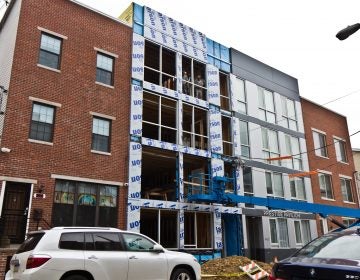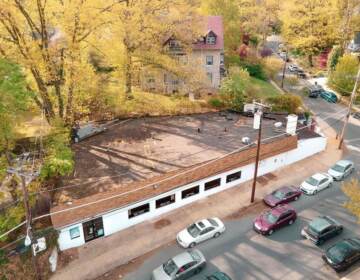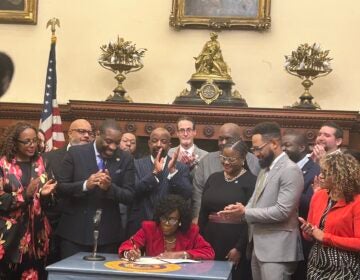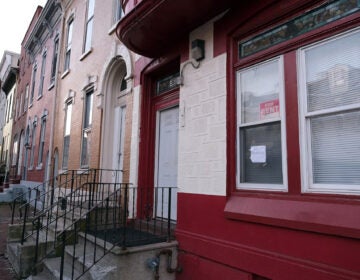Philly wants to prevent people from being priced out by requiring affordable housing in some new developments
Council passed a bill that requires affordable units be included in large residential developments in parts of North, West, and Northeast Philadelphia where rents are rising.
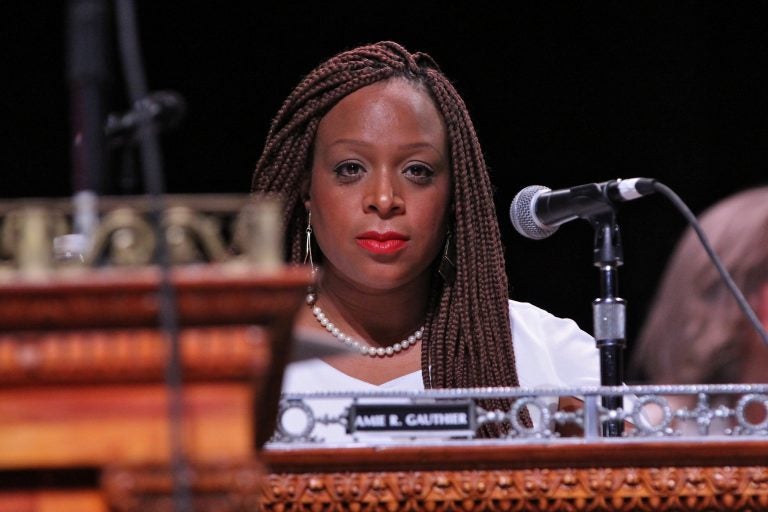
Philadelphia City Councilmember Jamie Gauthier. (Emma Lee/WHYY)
City Council on Thursday passed a bill that would require affordable units be included in large residential developments in parts of North, West, and Northeast Philadelphia where residents are seeing rents rise.
The measure requires any development with 10 or more housing units to set aside 20% of the units as affordable. Known as inclusionary zoning, the policy is a tool for keeping housing accessible in fast-developing areas, and has been used in cities such as New York and Washington D.C.
The new bill only applies in the 3rd and 7th Council Districts represented by co-sponsors Councilmembers Jamie Gauthier and Maria Quiñones-Sánchez respectively.
“The continued growth of our city is important, but it’s unacceptable if it comes at the detriment of vulnerable Philadelphians,” Gauthier said in a statement. “With many developers prioritizing profits, regardless of the social repercussions, the best way for us to ensure that affordable housing options remain available in desirable neighborhoods over the long term is to enact policy change.”
The bill, passed unanimously, comes amid a development boom with skyrocketing real estate prices, a combination housing advocates say is problematic for a poor big city with an affordable housing crisis, in part because it makes the prospect of building affordable housing even less attractive to developers, particularly those looking to build in swiftly gentrifying neighborhoods like University City and East Kensington.
That dynamic is why the legislation requires at least 15% of the affordable units to be built on the same property as the market-rate housing.
Under the new bill, developers can apply for a waiver from the city’s Department of Planning and Development if they want to fulfill any part of the remaining 5% by building units offsite or making a contribution to the Housing Trust Fund.
Both the on-site and off-site units must be affordable to households earning up to 40% of the area median income, which translates to $37,800 for a family of four, according to federal data.
“This is critically important because of the ever-increasing risk of displacement that our low-income Black and brown communities are facing,” said Gauthier.
Mo Rushdy, treasurer for the Building Industry Association of Philadelphia, called the measure “ink on paper” legislation — a bill that will make its sponsors look good, but little else. He said the only thing the legislation will accomplish is to discourage developers from building in the areas specified in the bill.
“They have created no-development zones in each of these overlays in both the 3rd and 7th Districts,” said Rushdy. “The neighborhoods already have tough economics. They have low revenues.”
Factor in increased construction costs, and Rushdy said the requirements laid out in the bill make it impossible for developers to make their projects financeable, hurting the low-income residents Gauthier and Quiñones-Sánchez envisioned the measure helping.
“It is such a misguided bill,” said Rushdy.
The legislation is part of a broader effort in City Council to increase and maintain affordable housing in Philadelphia.
In September, city lawmakers passed a bill that tweaks an existing inclusionary zoning program that allows developers to construct larger buildings than allowed under zoning regulations if they agree to build affordable housing units or contribute to the city’s Housing Trust Fund.
The measure, seen as companion legislation to the bill that passed Thursday, only applies to developers seeking height and density bonuses for properties with 10 or more units. It also bars developers building in a short list of zoning districts (RM-1, CMX-1, CMX-2, or CMX-2.5) from receiving a height bonus if they choose to contribute to the housing trust fund.
On Thursday, Council’s final session before the holidays, the legislative body passed a resolution to hold hearings to discuss the hundreds of federally assisted rental units that could vanish if property owners opt not to renew their affordable housing contracts with the federal government or extend the initial terms of the low-income tax credits they received to build them in the first place.
 WHYY is one of over 20 news organizations producing Broke in Philly, a collaborative reporting project on solutions to poverty and the city’s push towards economic justice. Follow us at @BrokeInPhilly.
WHYY is one of over 20 news organizations producing Broke in Philly, a collaborative reporting project on solutions to poverty and the city’s push towards economic justice. Follow us at @BrokeInPhilly.

Subscribe to PlanPhilly
WHYY is your source for fact-based, in-depth journalism and information. As a nonprofit organization, we rely on financial support from readers like you. Please give today.




